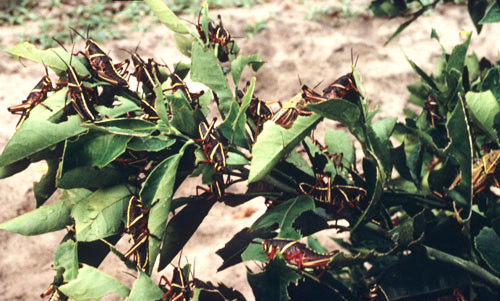
Young nymphs of the eastern lubber grasshopper, Romalea microptera (Beauvois), clustered on a citrus reset (young citrus tree). Photograph by John Capinera, University of Florida
The Eastern Lubber Grasshopper, also known colloquially as the “Georgia Thumper,” can be highly destructive to a variety of vegetable crops. This May many growers and vegetable gardeners have reported unusually high numbers of nymphs, the juvenile form of the grasshopper.
This observation is consistent with the usual increase of nymphs in vegetable plantings during the spring months. The old adage of “an ounce of prevention is worth a pound or cure” applies here. Now is the time to exert control over the nymphs before they mature. Adults do the greatest crop damage in July and August.
Additionally, adult females lay their eggs in the summer, with hatching the following April. Reducing the numbers this year will reduce the numbers in the following years.
The first step to control of the Eastern Lubber Grasshopper is prevention. They like to feed on weedy vegetation, so reducing weed cover in and around crops will reduce the incidence of Eastern Lubber damage. Short vegetation does not usually provide enough forage for grasshoppers, so mowing vegetation around fields is an excellent preventative strategy.
Although most home gardeners can control Eastern Lubber Grasshoppers by mechanical means (hand picking) this is usually not a feasible option for multi-acre operations. Fortunately, there are several products on the market for commercial producers to use.
Keep in mind, grasshoppers are much easier to control while they are in the young nymph stage, so early action is paramount when nymphs are observed. Several effective insecticides include carbaryl, bifenthrin, cyhalothrin, permethrin, and esfenvalerate. Look at the label to find these active ingredients, since they are sold under various brand names.
For more information about the Eastern Lubber Grasshopper or for specific crop recommendations, please visit this UF/IFAS publication on Grasshoppers and the UF/IFAS Featured Creatures Entomology Page.
- Steps to Remedy Non-Productive Pecan Orchards - June 30, 2023
- If Not Disease, Then What? Abiotic Vegetable Disorders - June 24, 2022
- Dormant Sprays Protect Fruit Trees from Future Insects and Diseases - January 28, 2022
